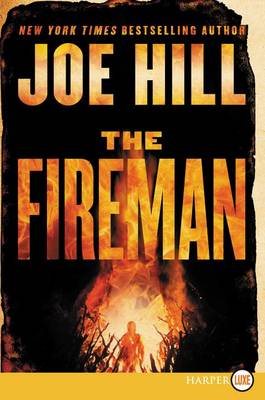Reviewed by pamela on
The Fireman jumps straight in to the action. The plague known as Dragonscale, which causes its sufferers to spontaneously burst in to flame, is already well under way when the book begins. We get to know the characters in the reality that they inhabit while still getting a sense of their characters, without any unnecessary build up or exposition. We immediately know who our protagonists are and the kind of people we're dealing with, all without them ever being caricatures of their archetypes. Each character has a struggle that they must overcome, and even the antagonists are agonisingly human in their misguided beliefs and mental instabilities. There are good characters and bad characters, but one gets the sense that if the story had been told from the other side those roles could so easily have been reversed. The titular Fireman is certainly no prince charming, and yet he is a character with such hidden depth and sarcastic wit that we can't help but relate. Nurse Willowes herself is a strong female character, fiercely protective, proud and yet equally aware of her own flaws. Even the peripheral characters have enough depth and back story to make us care about them and relate to their struggles.
The way Hill deals with relationships in The Fireman is quite unique, and individual to each case. He shows marriage in both its positive and negative aspects. He doesn't dwell on sweeping romantic gestures and instead shows romance as organic and often mundane, but beautiful in the every day things that make up a relationship. He shows how relationships can create strength but also weakness, how it can bind but also tear apart. The characters remain individuals and unique as part of their relationships, whether they be romantic, communal or familial and ultimately it the actions of individuals that can make or break the ties that bind us. The Dragonscale itself plays an interesting part in the portrayal of these relationships, responding to human connection in a way that gave the book the unique depth that it has.
This novel is so much more than its genre would suggest. Hill is the master of humanising the supernatural and using it in such a way as to draw attention to ourselves and our own reality. The Fireman reads like a perfect blend of Cormac McCarthy's The Road, Shirley Jackson's The Lottery, The Walking Dead and Adam Nevill's The Ritual, all interspersed with Hill's signature wit and humanity. The Fireman isn't neat, there are no perfectly tied up conclusions, people can be cruel and life unfair, but through it all the novel is full of hope and sympathy. A perfect novel for an imperfect world.
Review also on my blog: http://iblamewizards.com/review-fireman-joe-hill/
Reading updates
- Started reading
- 20 June, 2016: Finished reading
- 20 June, 2016: Reviewed
